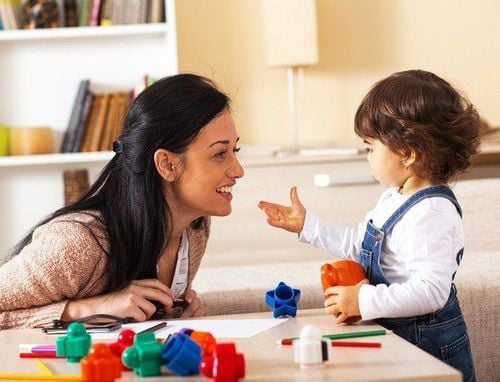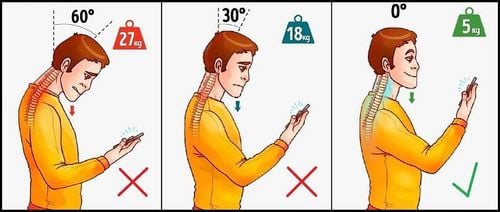This is an automatically translated article.
Children 18 months and older can use electronic devices to watch a program or play a children's game. But for babies under 18 months old, using electronic devices doesn't seem to bring any real benefits, and it can even lead to some health and development problems. In addition to considering how children use electronic devices, you also need to pay attention to the time children use electronic devices during the day.1. How long is it safe for children to use electronic devices?
The American Academy of Pediatrics (AAP) recommends turning off all screens around infants and toddlers (children under 18 months of age). Children 18 months and older can use electronic devices a little, but it should not be more than an hour a day.But the American Academy of Pediatrics also emphasizes that setting limits on screen time isn't enough: It's important for parents to choose programs and games that are age-appropriate, also engage your child for the duration of the device rather than simply handing the phone over to the child to use as an electronic babysitter.
A recent survey in the US found that 2 out of 3 babies and 4 out of 5 toddlers watch movies, TV shows or videos online. About 16% start watching phone/TV screens before the baby is 3 months old and 50% by the time the baby is 7 months old. Overall, 1 in 5 kids watch more than 3 hours a day.
Although there is no survey on children using electronic devices in Vietnam, the reality is that more and more children are being allowed to use these devices earlier and for more time.
Obviously, this is not in line with what the experts prescribe. Parents often let children use phones, watch TV to make it easier for children to eat, to have time to do other jobs, sometimes to have time to rest.

Trẻ em từ 18 tháng tuổi trở lên có thể sử dụng thiết bị điện tử nhưng không quá một giờ mỗi ngày
2. Is it harmful to let children use electronic devices?
Whether children use electronic devices to watch harmful programs, videos or play games depends on many factors.If you watch a program that is appropriate for your child's age and talk with your child about it, this is a good thing that can be beneficial to the child's development.
But if you leave your child alone, watch them for hours at a time, or expose them to content that is not appropriate for their age, it can be harmful to them.
When children use electronic devices can have an impact on a child's development, including:
Language development: one of the biggest concerns is that screen time can affect communication. language acquisition of children. Until a child is about 2 and a half years old, their language development will not be effective just from watching something on a phone/TV screen. One study found that in children under the age of 4, the more hours they watched TV, the fewer words they learned. However, children as young as 12 months old can learn new words from digital media if their parents watch them with them and continue to repeat and reinforce new words. Because babies and toddlers speak by interacting with parents and caregivers, absorbing sounds, words, body language, and eye contact. Children also need quiet time to practice and experiment with their voices.
Social and emotional development: infants learn to socialize by connecting face-to-face with their parents, but distracting digital screens can interfere with this connection. A study found that when the TV or phone is on, parents are less likely to interact with their children. Two other studies observed that the more focused parents were on their children's mobile devices, the less likely they were to interact with their children.
There are also concerns that electronic screens could lead to inattention and behavioral problems in children. Researchers have found that babies and toddlers who watch television at an early age may have a harder time managing their emotions and self-comforting as they get older.
Weight problems: researchers have drawn a link between excessive screen time and obesity in preschool-age children and older. A recent study found that a toddler's body mass index (BMI) increased with each hour of electronic device use per week. For children of all ages, it's important to be active because physical activity promotes physical development and encourages healthy habits.
Sleep problems: Many studies have found that the more time children spend in front of electronic screens, especially at night, the less sleep they get. This is true even for infants under 6 months of age. And it's especially worrisome when young children need a lot of sleep to thrive: Babies 6 months and older need 15 hours of sleep a day, and toddlers need up to 14 hours a day. Parents should be careful not to allow the use of any electronic device screens in their children's bedrooms, even small screens like phones and tablets have been implicated in quality degradation. children's sleep. The light emitted by screens can slow the release of melatonin and actually make it harder for children to fall asleep. Showing your child something on the screen is stimulating and makes it harder for them to fall asleep.
3. How does screen time affect infant and toddler learning?
A child's brain develops fastest during the first three years of life, and children learn best when they fully utilize all five senses to receive information. The experience of holding an apple, smelling it, tasting it, and hearing its name through a real person is far richer than seeing an image of an apple on a screen and hearing the sound from it.The biggest concern is related to letting children use electronic devices, letting them spend time on them, instead of children participating in other activities. The latest recommendations from the American Academy of Pediatrics emphasize the importance of parental involvement: If you're going to let your baby or toddler watch the phone/television, it's best to sit down. with your child, make it an activity that you both participate in.
Even turning on the TV in the background can harm children. To date, no one knows the full impact, but some scientists believe that background sounds and images distract young children from play, which is essential for a child's learning. child.
Claire Lerner, a social worker and parenting counselor at Zero to Three, a nonprofit focused on early childhood development, says: "Children need a lot of focus and focus. The use of electronic devices hinders cognitive development." Besides, she added, for babies and toddlers with a long sleep duration (>12 hours/day), the amount of time the child is awake is not much, so most of this time should not be left to the child. use electronic devices.

Bộ não của một đứa trẻ phát triển nhanh nhất trong ba năm đầu đời
4. Should children use electronic devices when they are restless?
Letting your kids use your phone or tablet is especially appealing when they're bored or upset for some reason. But relying on electronic devices to avoid tantrums can actually do more harm than good.One study found that infants and toddlers who spend more time using electronic devices have more difficulty self-soothing. Other researchers have found a link between increased screen time and behavioral problems in children, but they're still not sure which is the cause and which is the effect. Do parents often use phones/TVs to soothe and distract upset children or do children develop behavioral problems from excessive screen time?
It's important for toddlers to learn to adapt to challenges, such as getting bored during a trip to the grocery store or being told they can't eat a candy bar before a meal dark. In fact, part of childhood is dealing with disappointments and watching them survive.
5. Is "educational" media better than regular games and programs?
High-quality educational programs are best for young children. However, for your child to really benefit from these programs, it is important that you watch them together and talk to them about the program afterwards. Young children simply don't learn much from screens unless adults are actively engaged, reinforcing new words and ideas for them.Several studies have found that quality programs for children can help preschoolers improve their language, cognitive, and social skills. These programs are carefully designed to support children's development.
However, it is not always easy to distinguish what is truly educational and what is not. You need to be especially careful with digital games and apps: just because an app is advertised as promoting a child's learning doesn't mean it's actually effective.
Developers can market an app as "educational" without meeting any standards and most of these apps don't follow a specific curriculum or use content from child development specialists.
To find the best media for kids, you should preview videos and apps before introducing them to children. Apps that require children to touch the screen carelessly or have distracting graphics should be avoided.
Instead, look for interactive elements that strengthen learning and thinking, and encourage children to participate in active activities.
It's hard to know exactly what babies and toddlers learn from these videos and games from electronic devices. Children's small brains may be trying to recognize what they are seeing like colors, faces, sounds. But whether they actually absorb it in a way that can be called learning is the big unanswered question.
6. Should children use Skype or FaceTime to chat with loved ones?
The American Academy of Pediatrics says brief video chats are appropriate for children as young as 18 months old, as long as a parent or other trusted adult is involved.Many families use video chat as a way to help children build strong bonds with grandparents and other loved ones who are far away. Parents who carefully limit their kids' device time often see video chats as an exception to the rule, and there are a number of measures to support that.
Video chat is definitely more interactive and beneficial for kids than watching passively. One small study found that 2-year-olds can learn new words while video chatting with adults. However, face-to-face communication is still considered the best for children.
7. Are e-books as good as printed books?
Even if you only use electronic devices to read, your child could be missing out on a lot. Researchers have found that e-books tend to distract both parents and children, making the experience less enriching. Not only do parents question less of a story when reading an e-book, but children tend to learn fewer words and have more trouble following along.Children will get the most out of the reading experience if you sit with them and talk about what they are seeing in the book or picture book. Traditional books are still the best way to get your child interested in reading, especially when he's lying next to you as you read aloud.
8. What could children miss if they don't use electronic devices?
The answer is no. It is not necessary to introduce electronics to babies and toddlers. Young children thrive when interacting with you and others. And the screens of electronic devices in general are just a distraction.Parents often feel pressured to introduce technology early so that their children can keep up with the development trend of society. But rest assured: Your kids won't be left behind if they wait a few years to learn how to use electronic devices. Because digital devices are so easy to use, when the time is right, children will quickly catch up. And your child will learn more from reading books with you than watching videos.
In addition, keeping children out of electronic devices means avoiding negotiations and failures over the right to use these devices. If your child never uses your phone, you won't have to worry about tantrums and phone arguments.
9. Should children use electronic devices?
You are the one to decide what is right for your family. If you allow your child to use devices, it is best to keep them for a short time and teach them how to use and experience them.Attention and moderation are important when letting children use electronic devices. Remember how long your child is using electronic devices and make sure that most of that time is spent with you. You should spend most of your child's day in free play, social interaction, and reading and playing with toys.
But we all live in the real world. Parenting is tough, kids' screen time is long and it can happen to even the most patient parents. If a 10-minute break helps you relax, or gives you enough time to prepare lunch or do the laundry, it's very easy to allow your kids to use electronic devices during this time.

Chú ý và điều độ là điều quan trọng khi cho trẻ sử dụng thiết bị điện tử
10. Strategies to manage children's time using electronic devices at home
Set a time limit: aim for less than an hour a day, or think about screen time per week instead of every day. On days when you're sick or it's raining, you can watch movies with your kids. On more active days, you may not allow your child to use the device. Allow electronic device use at important times, like in the morning shower or preparing dinner. Do not leave the TV in the background: the time the TV is on in the background is still counted as time using the electronic device. Most babies and toddlers are perfectly satisfied when you share books or toys with them. If you need entertainment, turn on music or an audiobook. Leaving devices out of the bedroom: You do not need to care about devices when sleeping and when your child gets older, you will be able to let them sleep in their own room, then your use of electronic devices will have less impact on your health. young. Choose age-appropriate content: when you give your child some screen time, choose age-appropriate content to reinforce learning. Talk to your child: share device time with your child as much as possible and chat about what you're seeing and hearing. Asking questions and interacting with your child will benefit the most. Be a good example: even at a young age, children learn and imitate you. Put your phone in the meal and you sit with your child but don't use the phone. If your child wants to play with your tablet, tell them it's a tool, not a toy.11. Strategies to limit screen time
Find a good daycare: choose a daycare center or preschool that has a no-electronics policy. Talk to your baby's nanny, babysitter or carer: make sure caregivers know and follow your family's rules about using electronic devices. Talk to family and friends: let loved ones know your rules, but also be flexible. If grandpa is playing a football game or all of your cousins are watching a YouTube video, you can also give your kids an exception. Talk to another parent if your child is playing an iPad at a friend's house. You may not allow your child to use electronic devices for the whole day. Offer more fun alternatives: for long car trips or flights, bring some of your child's favorite toys and books, so that when your child gets tired or impatient, you have tools other than phones or tablets for your child to use.Please dial HOTLINE for more information or register for an appointment HERE. Download MyVinmec app to make appointments faster and to manage your bookings easily.
Reference source: babycenter.com








